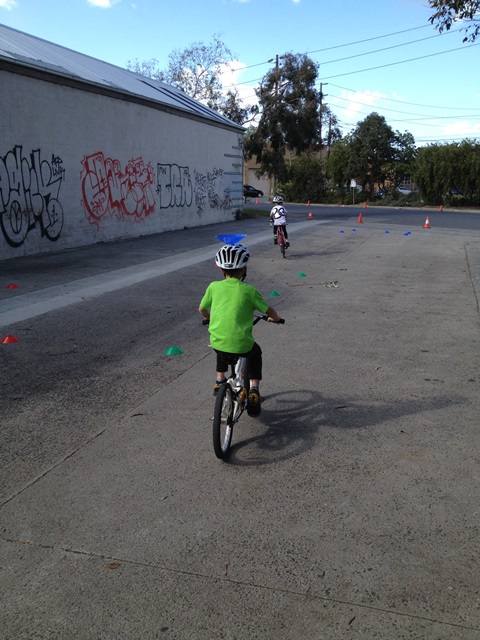SKCC Juniors Program
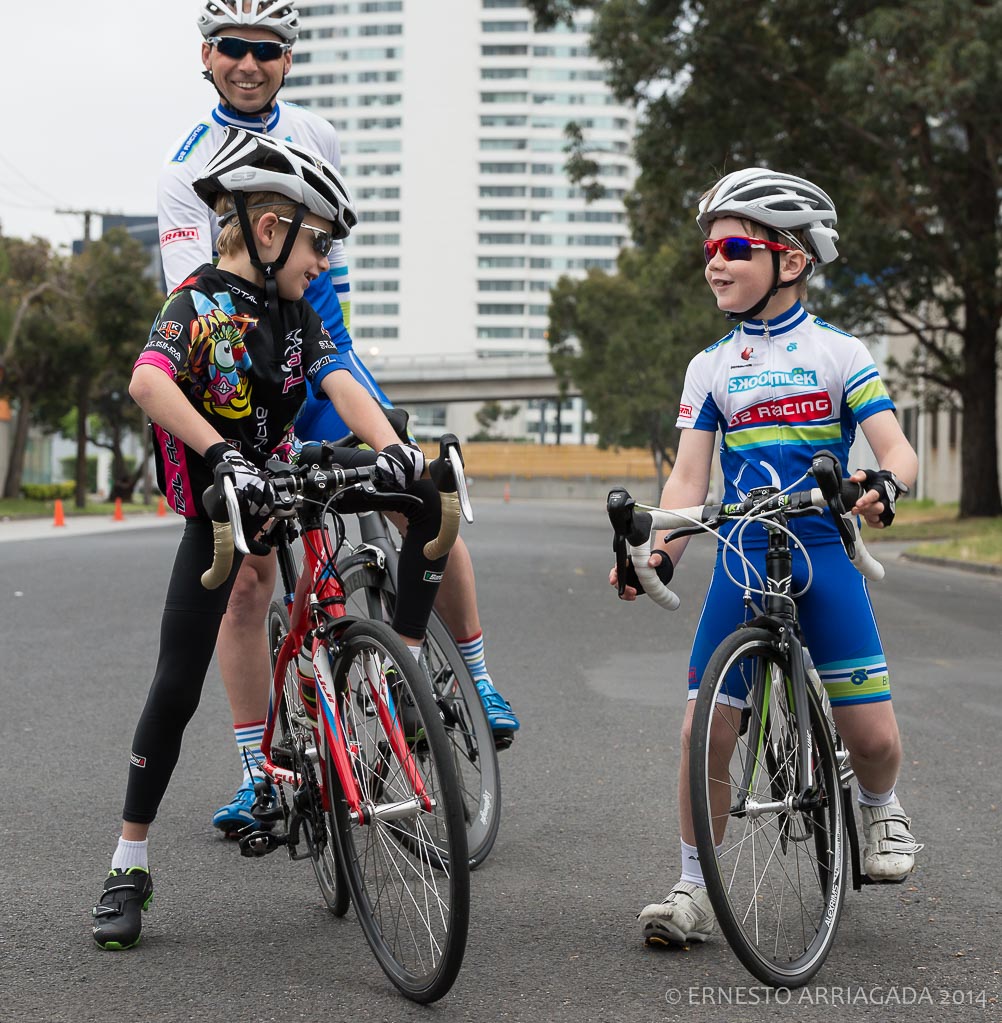
Are you interested in Junior Cycling?
SKCC aims to provide junior cyclists with appropriate development opportunities to assist with furthering their cycling skills and performance and their enjoyment of the sport.
Starting in junior cycling can seem intimidating, and parents new to the sport have lots of questions: what equipment to buy, which licence to get, where can my daughter or son train and race, which races are appropriate and how much training should they be doing? What kit can they wear and most of all, is it the right sport for my child?
St Kilda Cycling club conducts a range of events, training sessions, skills development and other activities to support junior riders to get the most out of their cycling, including junior rides, track training and mountain bike sessions.
Our Junior Track Development Program runs on Saturday Mornings at the Darebin International Sports Centre (DISC), and caters for Novice to Advanced Juniors. Our popular criterium racing at Port Melbourne now has junior grades (Junior A & B), which run at 7:15am during summer.
Cycling can be an awesome sport for young girls and boys. Whether they just want to ride with their friends, ride to school or race competitively, there is a host of benefits to getting your kids on a bike.
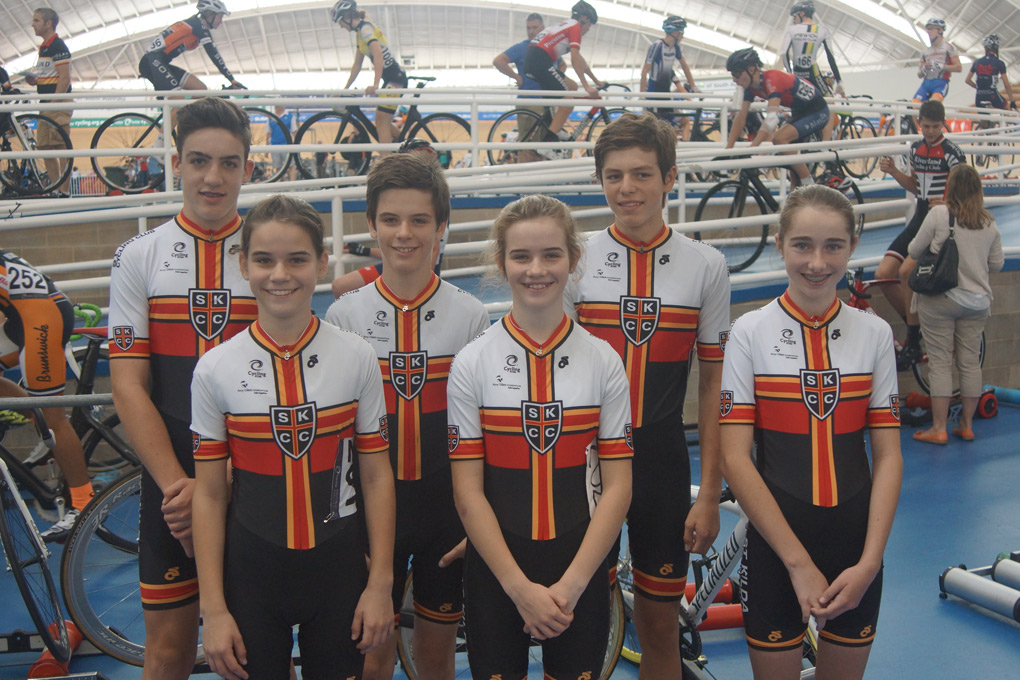
Junior Racing
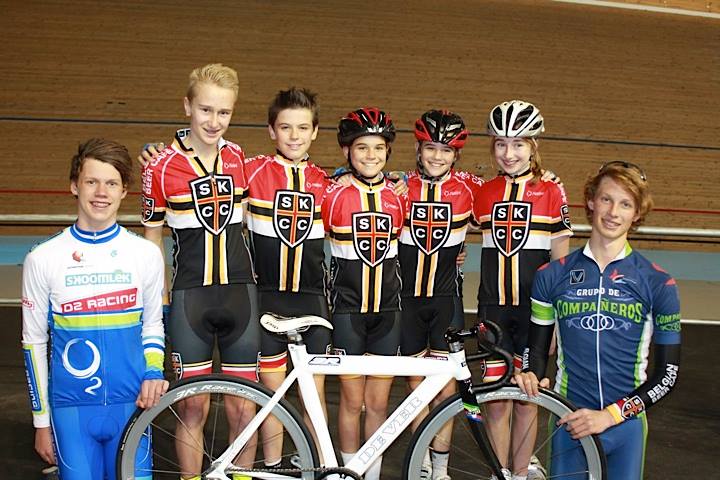
SKCC Crit Racing
SKCC runs Junior grades at its Crit races when scheduling allows. Races are held on Lakeside Drive, Albert Park, in the weeks prior to the Australian Grand Prix (usually February or March). Further details and entries are via EntryBoss.
Road Racing Northern Combine
Over winter, the northern combine (a group of clubs) run road races. Junior grades are offered at combine races, and also conducted at National Boulevard circuit on weekends where there are no races on the Northern Combine Calendar. Pre-entry required on the website.
Track Racing
Junior racing is held every Tuesday night at DISC (run by Brunswick Cycling Club). Entry on the night. Refer to the Cycling Victoria website for more options.
State Opens
There are also many track and road State Opens conducted throughout the year. Entry is via the Cycling Victoria Website. Racing is usually conducted in Age groups.
How old does my child need to be?
Recreational licences allow juniors to take part in training sessions and are available for juniors as young as 6. Racing categories start from Junior 11 (9 years old).
Junior 11/13 – The focus for kids J13 and below should be on participation with a focus on learning to ride safely. Participants should be developing skills and friendships. Training and racing should be minimal, with only a couple of sessions a week.
Junior 15 – age group should be based on furthering skills and friendships with a focus on learning how to train. There are many more racing categories, and juniors can start to participate in opens, as well as national competition.
Junior 17 -This age group is usually the most focused on training to race, the fields are usually bigger than the lower age groups. This age group can compete in state and national competitions.
Junior 19 – Whilst there are several junior 19 specific races, this age group mostly competes with the seniors/elite. J19’s can compete in senior open events (such as Victorian Road Series), and some compete at National Level. Junior 19’s can also (if selected) compete in Junior World competitions in Road, Track and Mountain Bike.
What licence do I need?
For juniors there are two types of licences – Racing (Gold) and Recreation (Silver).
A recreation licence, allows you to attend group rides and training sessions run by the club, and is an annual licence, which renews quarterly from when you join.
A racing licence, allows you to participate in any club or open races that your age group is eligible for.
Racing membership runs on the calendar year 1st Jan to 31st December, not from when you join. If you join between 1st July and 30 Sept you are eligible for a 6 month discount, and from Oct 1st can you join for the following year and get the first 3 months of the year free.
|
Born |
Fee |
|
|
Race Licence (Gold) |
||
|
U9 to U13 |
2005-2009 |
$94.50 |
|
U15 – U17 |
2001-2004 |
$220.50 |
|
U19 |
1999-2000 |
$220.50 |
|
Recreation Licence (Silver) |
||
|
Kidz – 12 and under |
2005+ |
$32 |
|
Recreational 13-18 |
1999-2004 |
$79 |
Family discounts are available for members that have several family members belonging to the same club. These must be processed manually.
More information about different licensing categories, family discounts and upgrades/downgrades can be found on the membership page
What equipment do I need to start?
Get to know your local bike shop, talk to them about racing, and make sure they know about the type of riding you want to get into. A good bike shop will be able to source any equipment you need, and a great bike shop has knowledgeable staff that can save you from making expensive unnecessary purchases.
Choosing a bike:
Kids grow, and bikes don’t, which means that if they are going to keep riding, you may be upgrading bikes several times. To begin with, get a solid bike. Don’t be tempted to get a bike that you will grow into, a bike that is too big or too small, will make it more difficult to ride. If you want to race, then drop bars are mandatory. Junior gearing is also important, (link to rollout), make sure that the bike you buy can accommodate your junior gearing (checkout the junior regulations).
Helmets are mandatory.
Protect your child’s most important asset, and make sure you get a well-fitting helmet, and it must be an approved helmet with the Australian Standard sticker.
Shoes
Think runners to start. Once they are comfortable, then you can progress to clipless pedals, and cycling shoes with cleats attached to the sole that clip into the pedals.
There are number of pedal and cleating systems now on the market, the most popular brands are shimano or look. Your local bike shop, will be able to help in this matter.
Clothing
To begin with, t-shirts or sweat shirts are fine. Cycling jersey’s are very comfortable whilst being close fitting, they wick away sweat to keep you dry and have pockets in the back to hold rain jacket, food etc. Club jerseys are a great way to feel part of the club, and SKCC have the best looking kit around. (Read all about the SKCC Kit)
Cycling knicks help young riders feel more comfortable on the bike. Cycling knicks are padded with an internal chamois to prevent chafing and are made with flat seams out of the area that you sit on! Note that underwear is not typically worn with cycling knicks as the seams in the underwear defeat the purpose of the knicks.
Clothing needs to be appropriate for the conditions they will ride in, for cold weather riding, you need gloves, jackets and wind vests.
Tools
We encourage all juniors to take care of their equipment, and at a minimum be able to cope with punctures. This means when you ride, you need to take tubes, levers and a pump, and know how to use them.
Lights
When riding on the road, rear lights are essential, and mandatory for any Victorian road races, that do not have full road closures.
Water Bottle
It’s really important to stay hydrated when riding and racing, so make sure your bike is fitted with a water bottle cage, and that you always take your water bottle with you – for longer rides, you may need two water bottles.
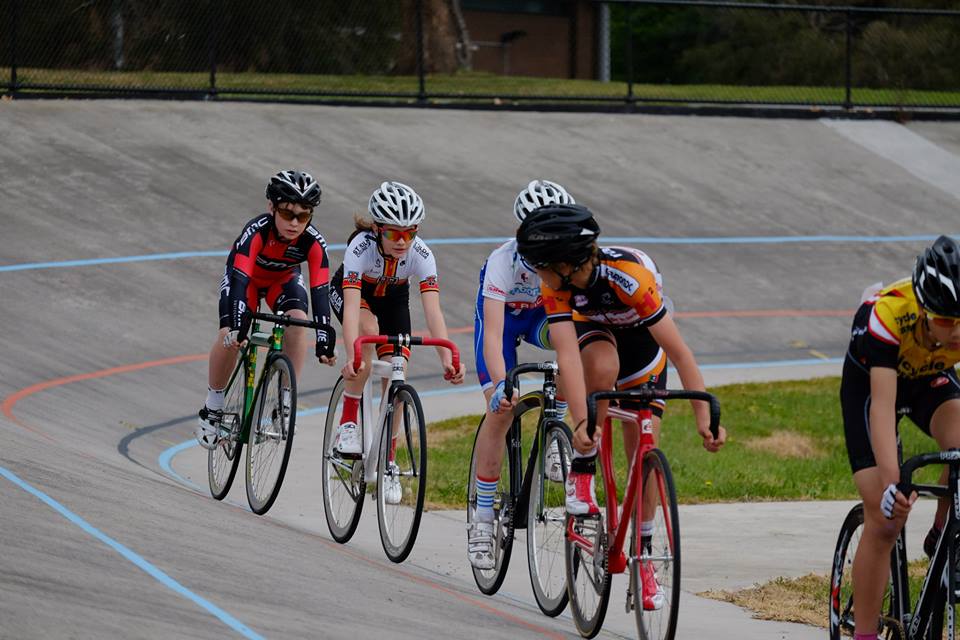
What are Junior Regulations?
Rollout Regulations
Gear restrictions apply to all junior cyclists in events conducted under Cycling Australia regulations on the road and track and all junior riders riding with SKCC are strongly encouraged to adhere to these gear restrictions to prevent injuries and to develop an efficient pedalling technique.
Roll Out Distance is the distance the bike travels in a straight line through one full revolution of the pedal cranks in the biggest gear on the bike. For Club racing and Victorian open’s gears can be locked out to restrict gearing.
For all National championship events gear lock out is not permitted.
J11/13 = 5.500 metres
J15 = 6.000 metres
J17 = 7.000 metres
J19 = 7.930 metres
A number of different gear combinations can suit each criteria. A gear calculator can be downloaded from the Cycling Australia Site
It must be noted that this is a guide only and the actual distance covered will be dependent upon brand and type of tyre fitted, therefore the rider must ensure compliance by measuring their own “roll-out”.
Junior Equipment Regulations
For all junior categories up to & including JM17 – JW17 the following equipment restrictions will apply for road & track competitions.
- For all events a standard triangular frame may only be used. Such frames shall consist of standard tubing of dimensions no more than 80mm maximum and no less than 25mm minimum. (refer Annexure 6 UCI Bicycle Regulation).
- For all events, wheels must have at least 12 spokes with the sole exception that construction of the rim shall exclude the use of composite fibres (Carbon, Kevlar, Aramid and similar fibres).
- Only high pressure detachable tyres and tubes shall be used. A detachable type tube means the tube is detachable from the tyre casing. Such high pressure tyres shall be beaded.
Junior Handlebars
Handlebars shall be of the standard “Classic” style. Bolt on handlebar extensions shall be allowed for under 15 and under 17 riders for the individual pursuit, team pursuit and road and track time trials only. No modification to the extension shall be allowed.
How much training should juniors do?
Training junior riders is a delicate balance. The most important factor is to ensure juniors enjoy their riding. This does not mean that performance is ignored, indeed if riders feel they are competitive and are progressing both technically and physically, they will enjoy their racing more.
Here is a general guideline for junior training – as set by Cycling Australia.
Please remember these are maximums and not recommendations as targets to achieve.
|
AGE GROUP |
TRAINING Per Week |
Per session |
Focus |
|
9-10 years |
1-3hrs |
Max 30mins |
Skills development, traffic awareness, safety |
|
11-12 years |
2 – 5hrs or 40 – 100kms |
No single session longer than 30km or 1.25hrs |
Skills development, traffic awareness, road safety, bike handling skills, race skills etc |
|
13-14 years |
3 – 8hrs or 100 – 200kms |
No single session longer than 60km or 2hrs |
Combination of both skills development & physical conditioning, all aspects. |
|
15–16 years |
6 – 14hrs or 150 – 350kms |
No single session longer than 90km or 3hrs |
Combination of both skills development & physical conditioning, all aspects. Some specificity in training can begin during the 16th year. |
|
17-18 years |
8 – 18hrs or 240 – 550kms |
No single session longer than 160km or 5hrs |
Physical conditioning, specific to certain events. Skill development is more event specific. |
What Junior Training is available?
Road
National Boulevard Junior Development is a Northern Combine initiative where graded junior racing is conducted at the National Boulevard circuit on weekends where there are no Northern Combine races. Graded Junior Road racing is also available at each Northern Combine round (usually a slightly different course)
Competent older juniors (over 16), can join the senior training rides (men’s and women’s) several mornings a week, leaving from Café Racer. Check out the Club training page, and the Women’s training page. Also look out for the graded club pro rides in your newsletter.
Track
SKCC Junior Track Development session is run on Saturday Mornings at the Darebin International Sports Centre (DISC). As well as the Junior session, experienced Juniors are also welcome at the general Track Sessions. Look out for dates in the general newsletter.
Cycling Victoria also run School holiday Programs and Come and Try Days catering to juniors that are new to track.
Code of conduct for junior riders, parents and spectators
Young people involved in cycling have a right to participate in a safe and supportive environment. The St Kilda Cycling Club expects all Riders, Parents and Spectators to abide by a Code of Conduct for all junior activities as a basis for fair play and to encourage fun, friends and a safe environment.
Junior Riders
- Compete by the rules
- Never argue with an official. If you disagree, have your coach or manager approach the official during a break or after the competition.
- Control your temper. Verbal abuse of officials and sledging other riders, deliberately distracting or provoking an opponent are not acceptable or permitted behaviours in any sport.
- Work equally hard for yourself and/or your team. Your team’s performance will benefit, so will you.
- Be a good sport. Applaud good performances whether they are made by you, SKCC riders or fellow competitiors.
- Treat all participants in your sport as you like to be treated. Do not bully or take unfair advantage of another competitor.
- Cooperate with your coach, team-mates and opponents. Without them there would be no competition.
- Participate for your own enjoyment and benefit, not just to please parents and coaches.
- Respect the rights, dignity and worth of all participants regardless of their gender, ability, cultural background or religion.
Parents
- Remember that children participate in cycling for their enjoyment, not yours.
- Encourage children to participate, do not force them.
- Focus on the child’s efforts and performance rather than winning or losing.
- Encourage children always to participate according to the rules and to settle disagreements without resorting to hostility or violence.
- Never ridicule or yell at a child for making a mistake or losing a competition.
- Remember that children learn best by example. Appreciate good performances by all participants.
- Support all efforts to remove verbal and physical abuse from sporting activities.
- Respect officials’ decision and teach children to do likewise.
- Show appreciation for volunteer coaches, officials and administrators. Without them, your child could not participate.
- Respect the rights, dignity and worth of every young person regardless of their gender, ability, cultural background or religion.
Spectators
- Remember that children participate in cycling for their enjoyment, not yours.
- Applaud good performances and efforts from all individuals, clubs and teams. Congratulate all participants on their performance, regardless of results.
- Respect officials’ decision and teach children to do the same.
- Never ridicule or scold a junior rider for making a mistake. Positive comments are motivational
- Condemn the use of violence in any form, whether it is by spectators, coaches, officials or riders.
- Show respect for all riders whether from SKCC or other clubs. Without them, there would be no competition.
- Encourage riders to follow the rules and officials’ decisions
- Do not use foul language, sledge or harass riders, coaches or officials.
- Respect the rights, dignity and worth of every young person regardless of their gender, ability, cultural background or religion.
This Code of Conduct has been adapted from Junior Sport, Codes of Behaviour, The Australian Sports Commission.

